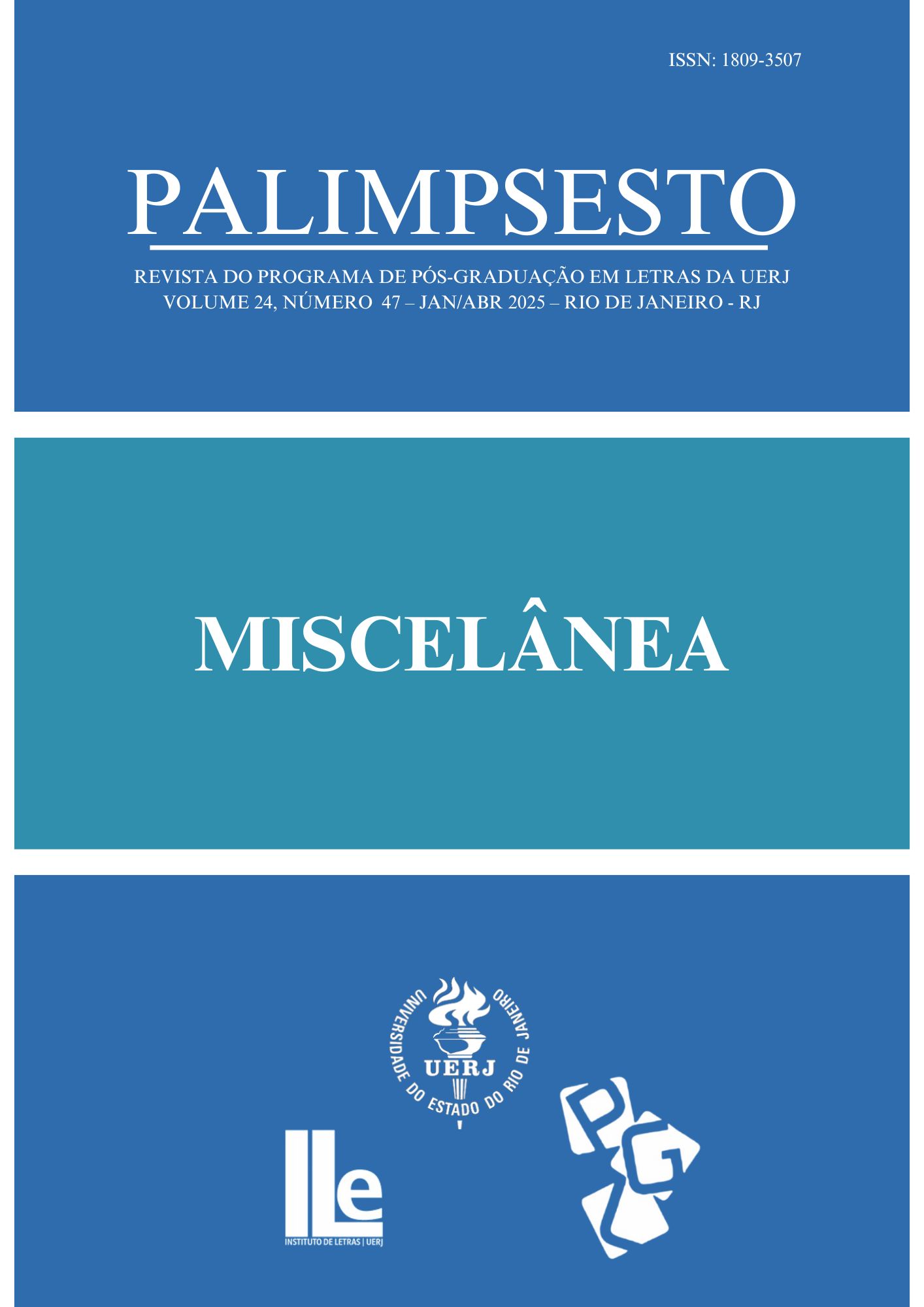Os cômodos do fantástico no conto Casa tomada de Júlio Cortázar
DOI:
https://doi.org/10.12957/palimpsesto.2025.86795Palavras-chave:
Fantástico, Casa tomada, Júlio CortázarResumo
O fantástico é reconhecido em uma narrativa pela incursão de algo estranho, extraordinário, que insere um conflito no cotidiano representado, no contexto familiar e verossímil. Tomando por base essa afirmação, o presente artigo discute o fantástico e sua construção no conto Casa tomada, de Júlio Cortázar, colocando luz sobre os elementos que compõem o relato fantástico: a realidade, o impossível, o medo, a linguagem e ainda a importância do narrador. Os pressupostos teóricos de Roas (2014), Furtado (1980) e Camarani (2014) fundamentam esse percurso, além de subsidiarem a análise da presença do leitor e de seus desdobramentos diante do insólito anunciado. A identificação desses elementos fantásticos possibilitou refletir sobre um contexto de opressão vivenciado pelos personagens, tão caro a esse gênero narrativo.
Downloads
Referências
BESSIÈRE, Irène. Le récit fantastique: forme mixte du cas et de la devinette. In: BESSIÈRE, Irène. Le récit fantastique. La poétique de l’incertaine. Paris: Larousse, 1974, pp. 9-29. Tradução de Biagio D’Angelo. Colaboração de Maria Rosa Duarte de Oliveira.
CAMARANI, Ana Luiza Silva. A literatura fantástica: caminhos teóricos. São Paulo: Cultura acadêmica, 2014.
CHEVALIER, Jean.; GHEERBRANT, Alain. Dicionário de Símbolos: (mitos, sonhos, costumes, gestos, formas, figuras, cores, números). 17. ed. Rio de Janeiro: José Olympio, 2002.
CORTÁZAR, Julio. Casa tomada. In: CORTÁZAR, Julio. Bestiário. Tradução de Remy Gorga Filho. Rio de Janeiro: Editora Expressão e Cultura, 1971.
CORTÁZAR, Julio. Julio Cortázar: Confira a última entrevista do autor, dada à revista Siete Días, no fim de 1983. La última charla. Tiro de Letra. 2012. Disponível: https://www.tirodeletra.com.br/entrevistas/JulioCortazar1.htm . Acesso em: 20 de ago. 2024.
FURTADO, Filipe. A Construção da Narrativa Fantástica. Lisboa: Livros Horizonte, 1980.
MAIA, André. A guerra fria e as ditaduras militares na América do Sul. Scientia plena. Sergipe. vol.10, num. 12. p. 1-20, nov. 2014.
REIS, Carlos; LOPES, Ana Cristina M. Dicionário de narratologia. 7. ed. Coimbra: Almedina, 2000.
ROAS, David. A ameaça do fantástico. Aproximações teóricas. Tradução de Julián Fuks. São Paulo: Unesp, 2014.
SIQUEIRA, Ana Márcia Alves. A linguagem fantástica em “coisas” – a rebelião necessária. Revista do NEPA/UFF, Niterói, v.10, n.20, p. 109-125, jan.-jun. 2018.
TODOROV, Tzvetan. Introdução à literatura fantástica. Tradução de Sílvia Delpy. México: Versão brasileira a partir do espanhol: digital source, 1981.
Downloads
Publicado
Como Citar
Edição
Seção
Licença
A revista Palimpsesto publica artigos e resenhas inéditos, referentes as áreas de Letras e Linguística. Publica volumes mistos e/ou temáticos, com artigos e resenhas em português, inglês, espanhol e francês.
Autores mantêm os direitos autorais e concedem à revista o direito de primeira publicação, com o trabalho simultaneamente licenciado sob a Licença Creative Commons Attribution, que permite o compartilhamento do trabalho com reconhecimento da autoria e publicação inicial nesta revista.

Palimpsesto utiliza uma Licença Creative Commons - Atribuição-NãoComercial 4.0 Internacional.







